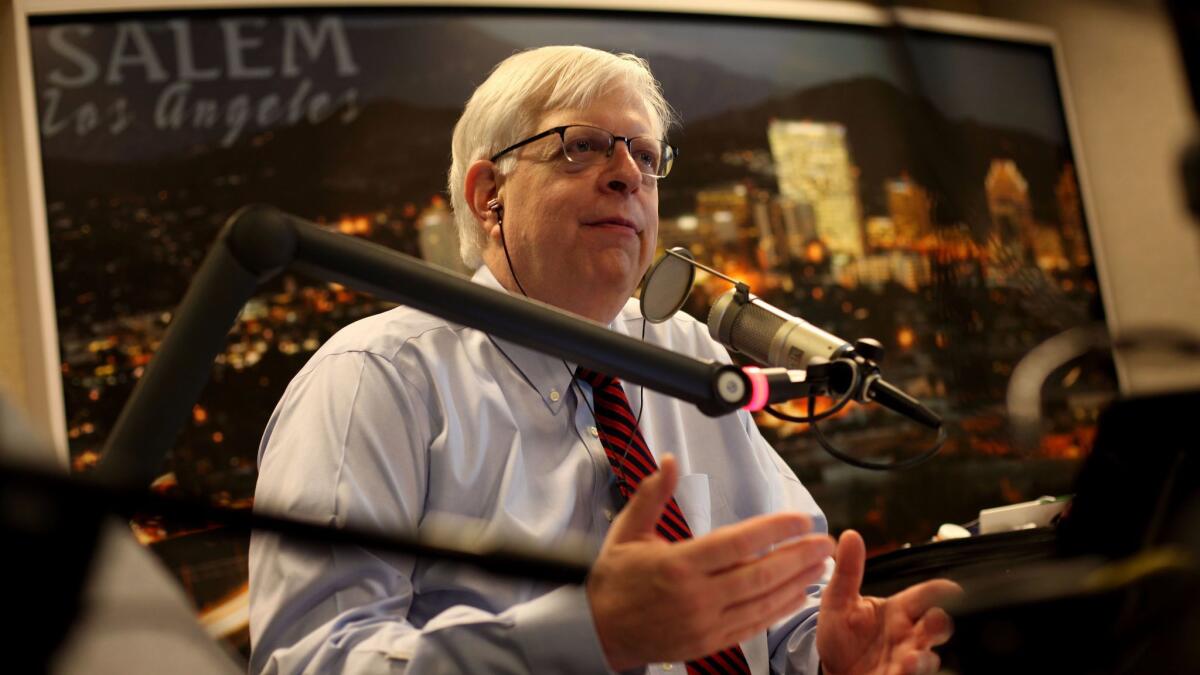How a Los Angeles-based conservative became one of the internet’s biggest sensations

Earlier this summer, as President Trump assembled online activists at the White House to thank them for their role in getting him to the Oval Office and – Trump predicted – keeping him there, one guest didn’t rush to claim credit.
Los Angeles-based Prager University, a registered charity, is legally prohibited from politicking. It isn’t truly a university and doesn’t have a campus. But the digital empire created by Dennis Prager, a 71-year-old conservative radio host and erstwhile Never Trumper, is having more success rallying young people to Trump’s side than many campaign committees aligned with the president.
The concise videos PragerU launches onto the internet every week to indoctrinate and motivate conservatives have been watched more than 2 billion times, according to the group’s count. Independent analysis done for The Times by Tubular Labs, a video measurement company, largely backs up that claim. PragerU consistently spends more on Facebook advertising than major political campaigns and national advocacy groups. It ranks among the 10 biggest political spenders on the platform.
Its videos are becoming a staple on college campuses, where Prager is dead set on overturning liberal orthodoxy. PragerU boasts that thousands of college and high school teachers screen its videos in their classrooms.
All that has caused considerable consternation on the left.
“It is a sophisticated campaign to indoctrinate young people,” said Tara McGowan, chief executive of Acronym, a nonprofit that advises progressives on digital campaigning. “The amount of money they are putting behind it is alarming and significant. They seem to have created a savvy way to push an ideology onto an audience and get a tax break in the process.”
Prager himself has limited affection for Trump. He compares his support for the president to the alliance President Franklin D. Roosevelt brokered with Josef Stalin in World War II –- a move born of necessity in the face of what he sees as a bigger evil (in this case, the left).
“We are not a Trump organ,” he said in an interview. “I would not be surprised if someone watching our 300 videos would affect the way they vote. I don’t live in a bubble. I recognize that. But that is not our raison d’être. It is to give people wisdom. We don’t believe the universities give wisdom.”
The segments are not full of memes and shouting. They are straightforward five-minute lectures in which a diverse array of stars from various segments of the ideological right rip into pillars of the left: multiculturalism, climate action, equal pay, Medicare for all, gun control, gay rights.
Despite Prager’s reservations about Trump, the videos do tend to echo the president’s grievances. Like Trump, many of them brand most mainstream news deceitful. And, as with Trump, PragerU’s critics say it is sometimes selective with facts.
The Southern Poverty Law Center warns that several PragerU videos, such as one arguing that black Americans are coddled by society, “function as dog whistles to the extreme right.” The Weather Channel branded PragerU’s challenges to global warming “a course in climate misinformation.” After watching a few PragerU videos, Princeton University historian Kevin Kruse tweeted that they were “utterly wrong on the facts.”
Prager’s supporters say he’s filling a need, especially for conservative young people on largely liberal campuses.
“People watch these videos in between classes, they watch them on the line at Starbucks,” said Bradley Devlin, a leader of the College Republicans at UC Berkeley, one of many campuses where PragerU has a network of representatives who push out each new video through social media and word of mouth.
“They point out the unsustainability of leftism and intersectionality, and the false promises of the left,” he said.
The site mixes intensely partisan videos with apolitical content. One week the focus is on trying to convince viewers that it is a media-generated myth that Trump called neo-Nazis in Charlottesville, Va., “very fine people.” Another week, comedian Yakov Smirnoff is giving marital advice.
The common thread is Dennis Prager’s worldview.
“We thought there was a dearth of intelligent presentation of the values we care most about … to make the case for a God-based moral system,” said Prager, a religiously observant Jew. “We play no role in Donald Trump’s election, no role in his presidency … We don’t talk about him. Not anti. Not pro. I am more interested that the viewer understand why they should honor their parents even if they have trouble with them than I am in the contemporary political scene.”
Prager says he disavows the alt-right ideology that has gained ground in the Trump era, but the online lessons often echo some of the movement’s talking points. A video of Dinesh D’Souza, the right-wing author, opining on why Western cultures are superior to others has been viewed 4.7 million times, for example.
Another, featuring Douglas Murray, the British author of several books about Europe and immigration, laments that North African and Middle Eastern immigrants have been permitted to destroy European culture by refusing to assimilate. It has 6.7 million views.
“You can be poor, middle class, rich, doesn’t matter,” conservative activist Candace Owens says in a video called “Playing the Black Card” that has been watched 11 million times. “The black card will still confer upon you an entire history of oppression, even if you have never been oppressed,” she says. “With the black card you can sell books full of indecipherable prose because with a card that powerful, who cares if your words make any sense?”
Whatever the motivation, however, the product is having a notable effect.
“The YouTube and Facebook algorithms like what they produce,” said Ramesh Srinivasan, a professor of information studies at UCLA whose upcoming book, “Beyond the Valley,” focuses on the relationships between technology and politics. “They predict it will capture people’s attention. It is not surprising they have grown to the extent they have.”
The polarizing nature of PragerU’s messages, along with the large social media followings of the presenters, take full advantage of the business model of the platforms, Srinivasan said.
“It is much more effective than the version of this content available on the liberal side,” he said, citing as an example the short presentations posted online by former Labor Secretary Robert Reich, which are popular among liberals but aren’t complemented by an array of other voices and content similar to what PragerU offers.
To amplify that content, the group has an annual budget of nearly $23 million, fueled in part by donations from religious conservatives, including $800,000 last year from Texan Lee Roy Mitchell, owner of a global movie theater chain and ally of the conservative Koch brothers. Other big donors include GOP megadonor Sheldon Adelson’s Maccabee Task Force, and the foundation of Adelson’s top deputy, Michael Leven.
Most of the seed money for PragerU came from Dan and Farris Wilks, billionaire brothers from east Texas who made their fortune from fracking and run a church called the Assembly of Yahweh. Farris Wilks preaches at the church. In his sermons, he has compared homosexuality to bestiality and declared climate change the will of God.
While the group relies on big-dollar conservative donors, however, 40% of its budget comes from almost 130,000 online donors. PragerU has more donors than some prominent Democrats running for president.
All that has fueled rapid expansion at PragerU’s Los Angeles studio, where the videos are produced, and has raised Dennis Prager’s profile, helped on by controversy.
When Prager was invited to guest conduct the Santa Monica Symphony at a fundraiser at Walt Disney Concert Hall two years ago, musicians citing what they termed anti-gay, anti-Muslim advocacy boycotted. The dispute drew national headlines. Prager devotees came out in force. The concert sold out.
He and comedian Adam Carolla later this year will release “No Safe Spaces,” a documentary about one of their favorite subjects: intolerance for conservatives on college campuses.
“It breaks my heart that a vast number of young people have not only not been taught how lucky they are to be Americans, but have been taught either how unlucky they are or how ashamed they should be,” Prager told a Senate panel last month that held hearings into conservatives’ claims that Google discriminates against them.
The site’s growth has been lucrative for Prager, who last year started collecting fees for his work with the charity. Tax filings show $237,500 went to his consulting firm. An additional $155,700 went to Prager’s son for help with fundraising.
“What he makes is negligible,” said Marissa Streit, CEO of PragerU. “If this were a for-profit, he would be making a lot more money. But we are not driven by that. We are driven by impact.”
Streit came into Dennis Prager’s orbit through an unconventional path. After living in Israel and serving in an Army intelligence unit there, she moved to Los Angeles and became the headmistress of a school in Manhattan Beach. On the job, she grew disturbed by the state of American education and the power of teachers unions.
“I was disgusted by the fact that colleagues kept telling me you could fire a plumber but not a bad teacher,” she said. The growing influence of what she calls the anti-Zionist movement in America, and the way Israel was portrayed in the media, also pushed her toward activism, she said.
Prager and his producer Allen Estrin recruited her to launch the group in 2009, laying out a mission that encapsulates Prager’s ambition as well as his combative view of ideological debate:
“Dennis said, ‘I feel like I have penicillin for the mind of this country.’”
More to Read
Get the L.A. Times Politics newsletter
Deeply reported insights into legislation, politics and policy from Sacramento, Washington and beyond. In your inbox three times per week.
You may occasionally receive promotional content from the Los Angeles Times.







